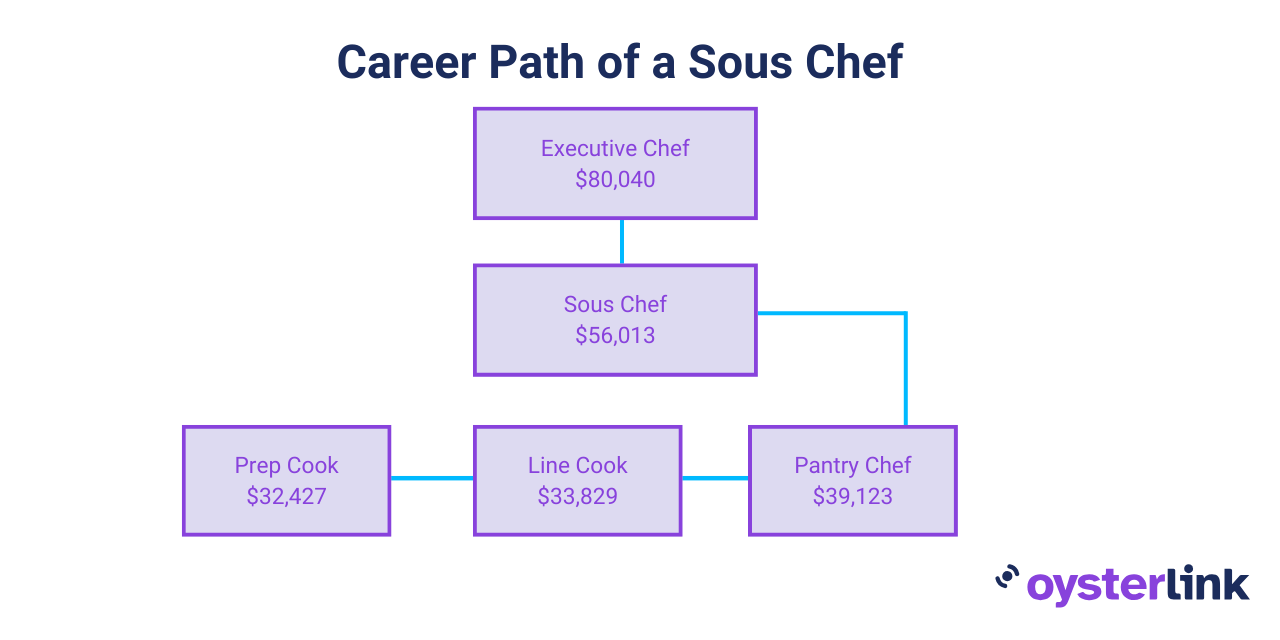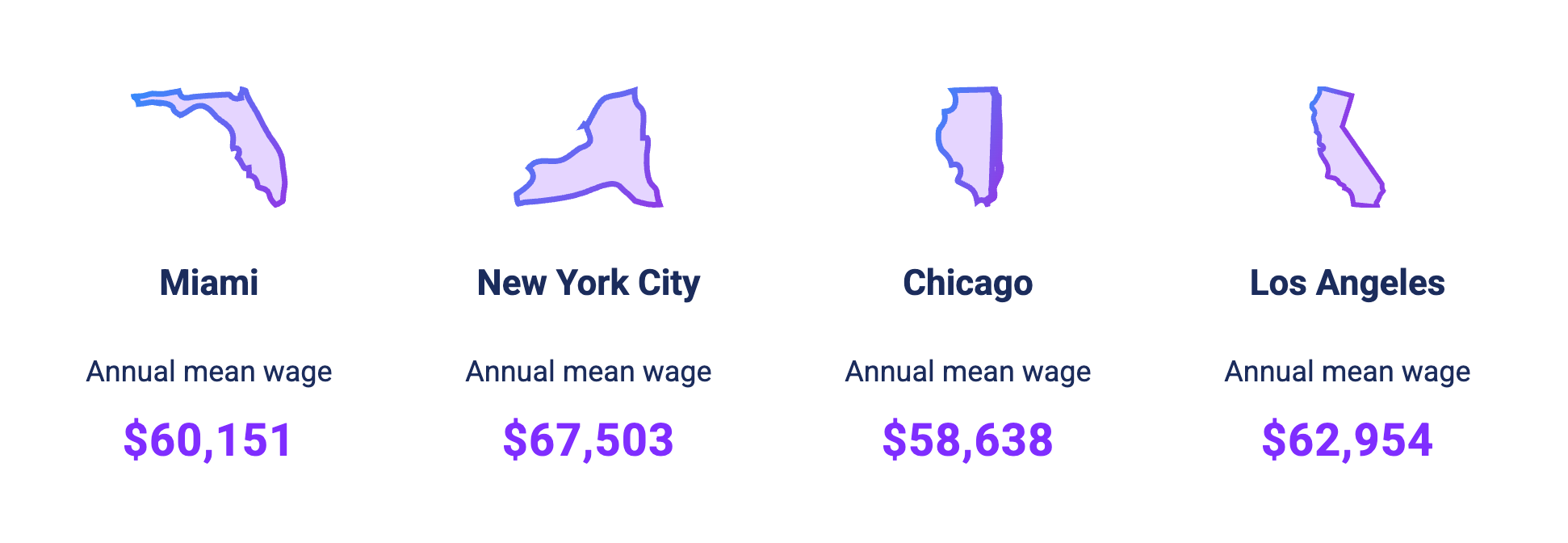Guide To Your Sous Chef Career
Every aspiring culinary professional wants to know what it takes to become second- and then first-in-command in a kitchen. Knowing this, we have prepared a complete Sous Chef Career Guide.
Continue reading and find out what steps you should take to progress in your culinary career and become a Sous Chef.
What Is a Sous Chef?
A Sous Chef is the second-in-command to the Head Chef and/or the Executive Chef in every kitchen.
Fun fact: The word sous originates from French, and in literal translation means "under." The word chef comes from, you guessed it right — chief.
A Sous Chef is in charge of ensuring the kitchen operations are smooth and nothing goes wrong. That said, they have a lot on their plate.
They also order ingredients, keep accurate and detailed track of the kitchen inventory list, take care of scheduling and ensure all the stations are clean and ready for the Head Chef or the Executive Chef. In sum, Sous Chefs prepare everything for a Head Chef or an Executive Chef to be able to create beautiful dishes for customers.
Watch the Video: A Day in the Life of a Sous Chef
[Source: Bon Appétit]
How To Become a Sous Chef?
Understanding what it will take to become a Sous Chef will help you build a rock-solid foundation for your career in the culinary world. We prepared a step-by-step guide to help you become a Sous Chef.
Side note: We know that some of the greatest culinary talents didn’t take the classic approach to building a career in culinary arts, and we appreciate and cherish them. While creating this career guide, we opted for the traditional approach, so we will start by saying — obtain a culinary arts education.
Certifications for Sous Chefs
We prepared a list of the best culinary arts programs you can attend in the U.S.
** We collected our certification data based on students' reviews, and numbers of students that got employed after getting the degree.
The United States offer various culinary arts programs. While some of them might be pricy, we happen to know that institutions such as James Beard and the American Culinary Federation offer scholarships to exceptional culinary talents.
Culinary Experience and Training
Once you have secured the education, you can proceed to work on your career foundation by building credibility in entry-level positions. Now, we understand that this might be a tad daunting, but let’s face it — climbing up any corporate ladder and reaching the top-hierarchy positions will feel similar.
There are very few individuals who have achieved success overnight. And while they might be inspiring you can also find inspiration in ordinary people that reached the stars. One such person is Chef Gustavo Montes. He started his culinary career path as a Dishwasher, and now he is a Head Chef and a catering company owner.
Continue building your knowledge through hard work. It is no secret that the culinary path is not an easy one, but it all pays off, especially if you have the creative worm and a passion for making people happy through food. You might need to pull 12-hour shifts under the guidance of your Executive Chef or Head Chef, but don’t let it discourage you.
If you show discipline, commitment and leadership skills you can get promoted to a Head Chef or Executive Chef position in less than three years.
What Does a Sous Chef Do?
We mentioned earlier that a Sous Chef is the person who helps ensure smooth operations of a kitchen. Now, we will use this section to talk about the specific duties and responsibilities of a Sous Chef.
Key Responsibilities of a Sous Chef
A Sous Chef supports an Executive Chef and takes over the command in case higher-ranking Chefs are absent from work. Sous Chefs must be able to make decisions under pressure and think on their feet — all while providing creative solutions for the establishment.
Their daily responsibilities might include:
- Inventory: A Sous Chef takes care of the kitchen inventory. They ensure that all the staff members have everything they need for their respective working stations in order to deliver outstanding meals to the customers.
- Adherence to health and safety regulations: While adherence to health and safety regulations is the responsibility of every kitchen team member, a Sous Chef is the person who will pass the final checks. They need to monitor and be on top of all the health and safety processes at all times.
- Recipe and menu development: While this is one of the main responsibilities of an Executive/Head Chef, a Sous Chef will be required to help out frequently. This is the best learning opportunity for every aspiring Sous Chef. If you find the right mentor, you will be able to learn a lot and prepare yourself for the next step of your career progression.
- Scheduling: Depending on the establishment and its processes, a Sous Chef might also oversee the scheduling of kitchen staff members for a smooth operation.
- Training: As the team grows, someone needs to mentor and train new team members. This falls under the responsibilities of a Sous Chef more often than you might expect.
As you can see, a Sous Chef needs to cover a lot of areas of work, but it’s great preparation for the next career step.
Skills of a Successful Sous Chef
The role of a Sous Chef encompasses a wide set of skills that you should develop to perform well in the role and set yourself on a path to success. While we already mentioned problem-solving abilities and creativity as non-negotiable skills, here is a full list of skills that you must develop.
Cooking skills
It goes without saying that a Sous Chef must develop exceptional cooking skills. Cooking might not be a daily responsibility for a Sous Chef, but they need to be able to step into the cooking line at any point.
Imagine that a Line Cook calls in sick last minute and you have a full restaurant. What would you do: Let the customers wait and get out of your restaurant disappointed — or step in and provide the best possible experience? You might also want to step in during peak times to build rapport with team members.
A skilled Sous Chef will also know the food and spices pairing, as well as all the cutting techniques, all the frying techniques and differences in each preparation process that other team members might not know.
In this position you need to be able to utilize different techniques and prepare everything from a simple salad to a complex entree, ensuring customer satisfaction and protecting the reputation of your establishment.
Organizational skills
Considering the number of tasks and duties a Sous Chef does daily, organizational skills are an absolute must. If you lack organization, you won’t be able to track the inventory, staff and customers, let alone step in the cooking line when needed.
Your Monday might be dedicated to helping the Executive Chef prepare and plan the menu and recipes while taking care of the team members who show up to work. Tuesday could be dedicated to training the new Line Cook and the Servers. Wednesday could mean you are in charge of the entire kitchen because the Executive Chef took a day off. Thursday might be stepping in to help out with cooking and preparing dishes for customers. Friday could be a combination of all the duties mentioned above but could also be dedicated to handling issues with suppliers.
By now you should understand why organizational skills are imperative in the role of a Sous Chef.
Communication and leadership skills
Communication skills and leadership skills go hand in hand. You can’t have one without the other.
Even though you will be second in the line of command, on occasion you will have to step in and take charge of the entire kitchen operations.
If you have built rapport with your team, you won’t have any issues leading them.
Here are some tips for improving your leadership skills:
- Radiate confidence – build authority without coming off as aggressive
- Motivate the team to work toward a common goal – customer satisfaction
- Communicate clearly
- Set boundaries
- Be supportive
Reliability
This skill will make or break your career progression. This is the foundation of building a great relationship with your mentor. The success of the establishment depends on the fact that the Executive/Head Chef can trust their Sous Chef. That said, you need to prove that you are trustworthy, hardworking, competent and loyal.
But it’s not only about proving these qualities, it’s also about maintaining them. If you want to succeed in your role, be prepared to come in early, bring new ideas to the table, motivate, lead by example and stay late.
Career Path of a Sous Chef
If you reached the position of a Sous Chef, you have already climbed the ladder high. After all, you are now the second person in command. However, there is still room for growth.
If you are just starting out, we prepared a full guide on career progression.

If you take the traditional approach to this career path it can take you anywhere between three and five years to become the second-in-command in a kitchen. This timeline will differ based on how long you stay in one establishment, the quality of your mentors, and the overall policies of the establishment. During this time, you should be consistently showing up and honing the skills that make a great Sous Chef.
If money is the biggest motivation for your career growth, this line of work might be interesting to you. Check out the next section to find out more information about earning potential for the role of a Sous Chef.
Earnings Potential for Sous Chefs
As per the salary data our team collected, the average base salary for a Sous Chef is $4,667.75 a month or $56,013 per year.
If you are already a Sous Chef and want to know where you stand compared to others check out our Sous Chef Salary page.
Additionally, if you are willing to move to a different city to start earning more money, check out the data below.
